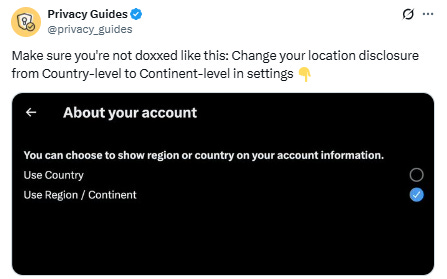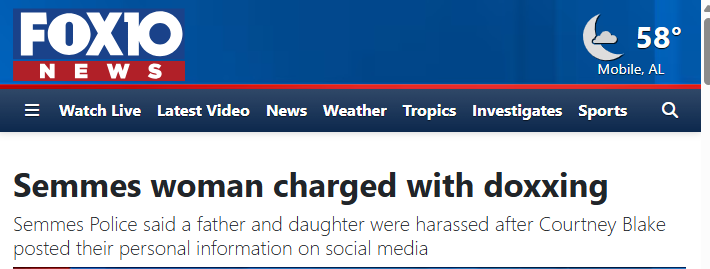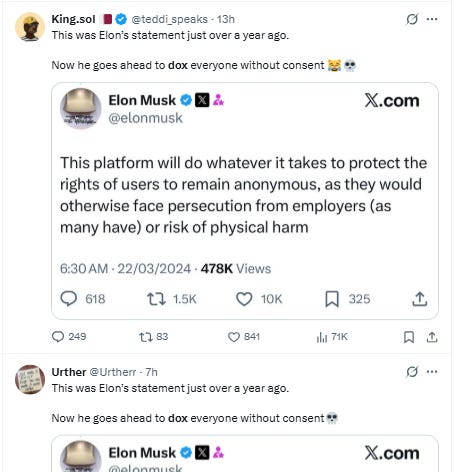A Quick Note About Doxxing...
A new feature on X/twitter has led to some interesting privacy claims
If you’ve ever worried about being doxxed, you’re not being dramatic. Having your personal details pushed into public view can wreck your sense of safety for a long time.
For anyone who’s outspoken online but prefers to keep their offline life separate, the stakes are even higher. Which is why we’ve spent a lot of time here talking about real doxxing risks and how to get ahead of them. You usually don’t get a warning before it’s your turn.
That’s exactly why it’s disappointing to see people calling X’s new “country/region” label “doxxing.”
What X Actually Did
X rolled out an “About this account” box that shows things like:
The country or region your account is based in
When the account was created
How often the handle has changed
The part that set people off: a label like “This account is based in: United States” (or whatever country X thinks you’re in).
Privacy Guides, one of the more respected pro-privacy platforms around, jumped on the “doxxing” bandwagon claim:

For almost everyone, this change doesn’t create a new, material risk. If you live in a big country with millions of people, “somewhere in the U.S.” is not actionable intelligence. It’s probably less specific than what most people already reveal in their bio or their tweets.
There are niche edge cases where it’s more sensitive:
people in tiny microstates, certain activists in hostile countries, or folks who already deal with coordinated harassment. For them, even a country label might feel like one clue too many, and that’s a reasonable fear.
But that’s not most people. And pretending it is doesn’t help. In fact, it hurts the privacy cause and could erode credibility.
What Real Doxxing Looks Like
Real doxxing is when someone exposes information that turns you into an easy target:
Your home or work address
Your phone number or personal email
Your kids’ school
Real-time location (“she’s at this café right now”)
Documents that connect your online identity to your offline one
That’s the stuff that leads to stalking, threats, swatting, and offline harm.

Putting “this account appears to be in Canada” in the same bucket as posting someone’s home address isn’t just wrong. It’s dangerous for the privacy movement.
Because if everything is doxxing, nothing is.
Why This Kind of Panic Backfires
Our worry is that every time privacy enthusiasts claim “doxxing” over something like this, we make it easier for everyone else to roll their eyes and tune us out.
We reinforce the stereotype that privacy folks are:
Overdramatic
Out of touch with normal users
Looking for something to be outraged about
That hurts us when we really need people to listen about:
Data brokers building detailed profiles on your life
Apps hoovering up precise location and selling it
Leaked medical and financial records
Platforms quietly expanding how they can share or retain your data
Those are high-impact risks. They’re where regular people can get fired, stalked, extorted, or denied opportunities.
If we spend our outrage on “X showed my country,” we’ve wasted it on something that, for 99.9999999% of users, isn’t moving the risk needle.
A Higher-Privacy-IQ Way to Respond
Instead of claiming “doxxing,” here’s what a high privacy IQ response looks like:
Adjust the setting if you’re uncomfortable.
X lets you switch from a specific country to a broader region or continent. No harm in doing that. Low effort, low friction. Privacy Guides got it right with this suggestion.Decouple your identity from your handle.
If you’re posting controversial opinions, don’t also list your employer, city, and LinkedIn in your bio. Country becomes less meaningful when it isn’t attached to a fully mapped offline identity.Treat X as a leaky platform in general.
Post like everything could eventually be connected back to you. That doesn’t mean live in fear. It just means don’t overshare.Spend your time on higher-ROI privacy moves.
You’ll become a much harder target by:Locking down your primary email and phone number
Using strong passwords and 2FA
Reducing what’s publicly visible about your home, family, and routines
Removing your data from online data broker sites.
Now about that last point - data removal from data broker sites. This is in our top three most recommended privacy moves. You can remove your data manually (inexpensive but time consuming) or you can pay a company to do it for you (costs $ but it’s also effortless and automatic).
We’ve used DeleteMe for 5+ years with great effect. There are other services out there that you can check out (EasyOptOuts and Optery are more budget friendly). Either way, this is one of the more effective ways to minimize your risk from a true doxxing event. If you want to give DeleteMe a look, click here to get 20% off.
Friendly Ask
If you found this helpful or informative, chances are your friends and family will as well. Please share it with them to help spread awareness.
Looking for help with a privacy issue or privacy concern? Chances are we’ve covered it already or will soon. Follow us on X and LinkedIn for updates on this topic and other internet privacy related topics.
Disclaimer: None of the above is to be deemed legal advice of any kind. These are *opinions* written by a privacy and tech attorney with years of working for, with and against Big Tech and Big Data. And this post is for informational purposes only and is not intended for use in furtherance of any unlawful activity. This post may also contain affiliate links, which means that at no additional cost to you, we earn a commission if you click through and make a purchase.
Privacy freedom is more affordable than you think. We tackle the top Big Tech digital services and price out privacy friendly competitors here. The results may surprise you.
Learn how email tracking pixels work, what data they reveal, and the best ways to block them to protect your inbox privacy.
Check out our specialized privacy and security guides in our digital shop. Below is a sample of what’s available. People are really loving the De-Google your Life Guide (available here at 25% off). Browse all the guides here. Annual paid subscribers get all the guides for free with their subscription (worth $115+).
If you’re reading this but haven’t yet signed up, join for free (3.6K+ subscribers strong) and get our newsletter delivered to your inbox by subscribing here 👇






